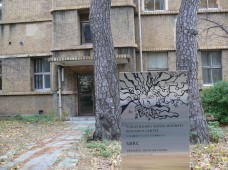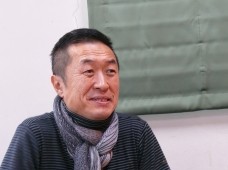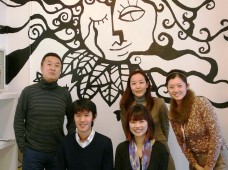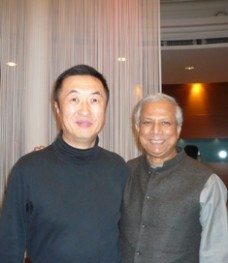2013.07.12
Interview with Kyushu University Vol.1
Kyushu University participated in the United Nations Academic Impact (UNAI) in February 2010, ahead of most universities and colleges in Japan. The University started the Yunus and Shiiki Social Business Research Centre (SBRC) in October 2011 to attract more public attention to investigation, research, and education in the field of Social Business.
Social Business here means a new business model advocated by the Bangladeshi 2006 Nobel Peace Prize winner and founder of Grameen Bank, Dr. Muhammad Yunus. Kyushu University established the SBRC after entering an exchange technology agreement with one of the Grameen Corporation in Bangladesh in 2007, aiming to contribute to poverty reduction by building a social information infrastructure and alleviating information disparities in developing countries. Since the establishment of the SBRC, the university has been actively carrying out joint research and projects in many fields.
According to Prof. Masaharu Okada, who serves as Executive Director of the SBRC at Kyushu University, Social Business has two directions. First, it is a type of business activity used to resolve social challenges, including poverty, health, environment, energy, education, and natural disaster concerns. Second, these business activities must be somewhat profitable.
Recently, the United Nations Information Centre (UNIC Tokyo) interviewed SBRC Executive Director Okada and two of his students learning Social Business at the SBRC at Kyushu University. The following discusses the SBRC’s initiatives based on one of the UNAI’s basic principles, Principle 8, which promotes “a commitment to addressing issues of poverty through education”.
* *** *
Professor Masaharu Okada issues daily instructions to his staff at Kyushu University Yunus and Shiiki Social Business Research Centre (SBRC), an institution that is aiming to become a hub of expanding Social Business in Asia. He commented on his lifelong connection with the United Nations, saying, “I have wanted to work for the UN since I was in high school. I seriously considered working for the international organization when I passed the qualification competition exam in 1985. However, I decided to continue working for the company I was with at that time. Later, in 2009, when I coincidentally met with Dr. Muhammad Yunus, I had another chance to be involved with the UN through the United Nations Academic Impact (UNAI).
The SBRC was established in the fall of 2011, with the Grameen Creative Lab @ Kyushu University (GCL@Kyushu University, established in 2010) as its parent organization. The SBRC conducts research, investigation and education in the area of Social Business advocated by Dr. Muhammad Yunus. Dr. Yunus is the winner of the 2006 Nobel Prize for founding the Grameen Bank, an institution that provides small, unsecured loans to the rural poor. The main concern in Social Business is to resolve a variety of social challenges, including poverty, using a business approach. The SBRC focuses on spreading its concepts and creating concrete Social Business practices by hosting regular workshops and international symposiums featuring Dr. Muhammad Yunus as a speaker. The SBRC also supports start-ups and the activities of the Yunus Social Business Club (YSBC), a private organization offering students opportunities to actively learn Social Business and engage in various activities to resolve social problems. Furthermore, the SBRC provides assistance for students who want to actively engage in international aid through activities such as Yunus Social Business Design Contest planned and operated by the YSBC, a study tour for Bangladesh, and other initiatives.
Prof. Okada has said, “One of the biggest strengths of the United Nations is the power of its brand. I believe students from Kyushu University can connect with students from around the world who share the same willingness to get involved through UNAI activities. This will allow the Kyushu University students to encounter new dimensions in their activities—and more importantly, spark an interest in students throughout the university as a whole”. Seeing students so engaged in learning Social Business at the SBRC, it was clear that Prof. Okada’s vision was coming to fruition.
* *** *
最近の記事
-
2026.02.12
「1.5℃の約束 – いますぐ動こう、気温上昇を止めるために。」国連とメディアによる気候キャンペーン、2026年も継続して実施 -
2026.02.10
科学における女性と女児の国際デー(2月11日)に寄せるアントニオ・グテーレス国連事務総長メッセージ -
2026.02.09
2026年の優先課題に関する総会でのアントニオ・グテーレス国連事務総長の発言(ニューヨーク、2026年1月15日) -
2026.02.05
日本の国連加盟70周年ロゴマークを募集します! -
2026.02.05
UNICブログ:2025年ヤング・アクティビィスト・サミット授賞式レポート 川﨑レナさん 「ハッシュタグからアクションへ」


























